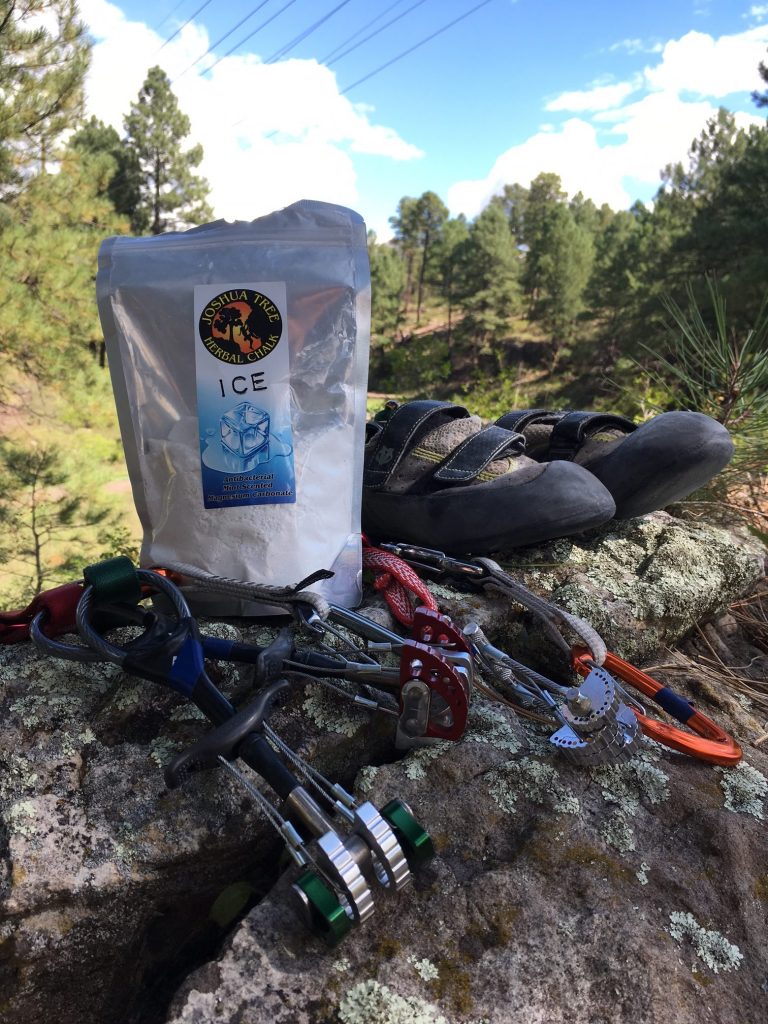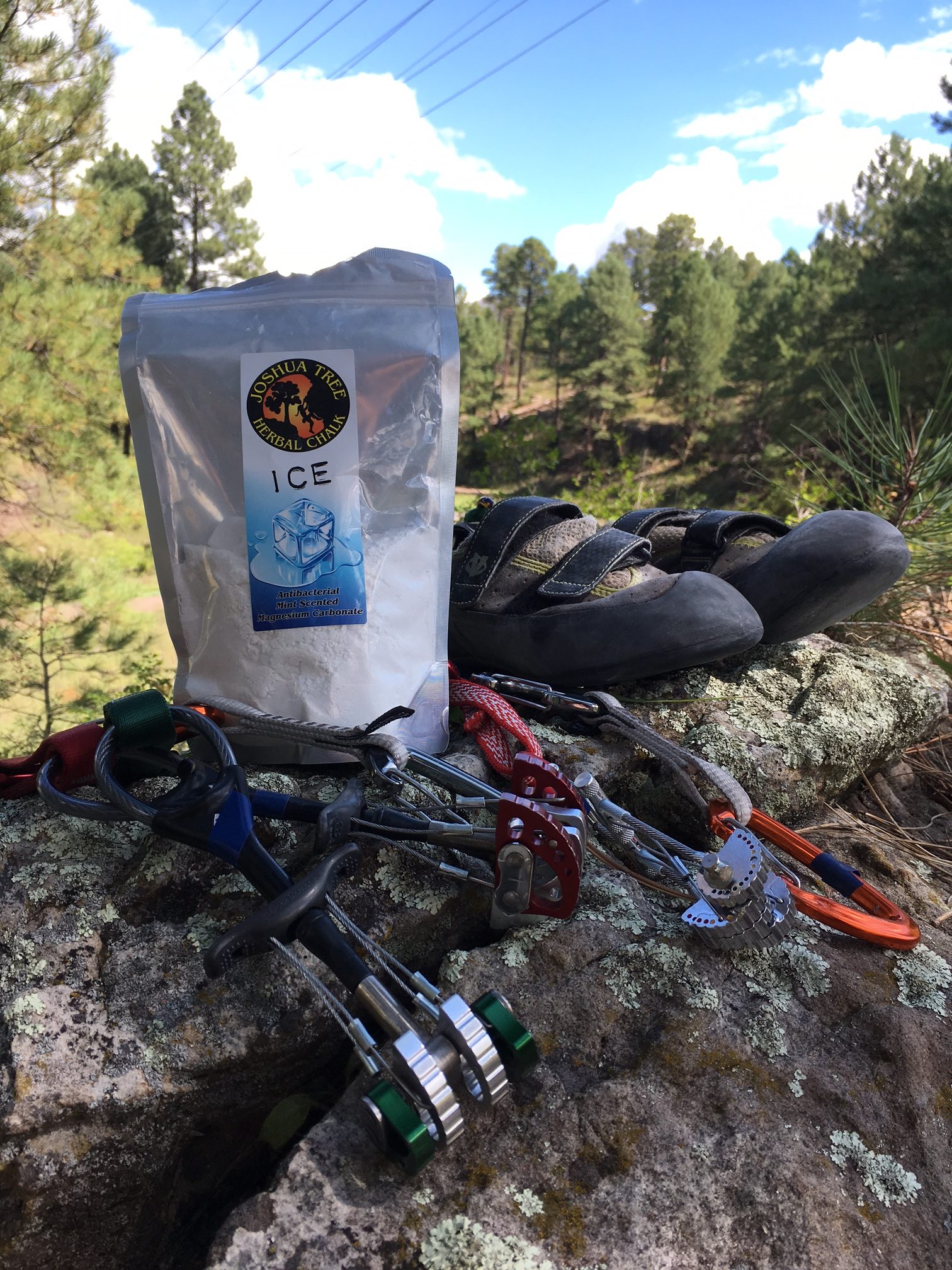Joshua Tree Herbal Chalk: A Quick Review

Hola!
There are two things that all rock climbers* have in common: 1) Their propensity to take their shirts off, and 2) Chalk! Chalk, like the secret sauce on a Mcdonald’s Big Mac, ties the whole shebang together. On any given night in the Red Rocks campground, a boulderer may be lamenting their failed attempt at Potato Chips, while a party of traddies are discussing their near-epic on an ascent of Crimson Chrysalis. Two different experiences were had by these groups, but if there’s any one tool in their respective kits that they have in common, it is climbing chalk (and maybe Pabst Blue Ribbon). Climbing chalk is ubiquitous among the rock climbing community. It can be found covering boulders and cliffs at crags far afield and, with a few exceptions, is standard world wide.
Climbing Chalk is often taken for granted, as it should be. It’s cheap, light, and no brand is significantly different from the rest. Thus, when you head to the store to buy shiny new climbing gear, don’t spend too much time thinking about which chalk to buy. It’s hard to mess up. At least, this was my opinion on the white stuff before I had the chance to try Joshua Tree Herbal Chalk.
New Stuff
Every year, outdoor gear manufacturers release new products. Most of the time, these are just small tweaks on existing products in their line, e.g. a lighter harness, or an altered belay device. Most of these products are marketed as giving the climber a slightly better chance of sending. Climbing Chalk, which is typically composed of a simple mineral compound that is designed to dry sweaty hands, seems like the sort of product that doesn’t need any modifications. That hasn’t stopped some people from trying, however. In a blatant grab for your money, new blends of chalk have appeared on store shelves. These new blends claim to be able to give you the slight advantage you need to climb harder. Brands like Friction Labs claim that their chalk is a cut above the rest. Despite being, in my opinion, over priced, many climbers that I have spoken to claim that there is a palpable difference. Perhaps they are worthy additions to this multi-thousand dollar facet of the Rock Climbing Gear Industry?
Enter Joshua Tree Herbal Chalk, from Joshua Tree Skin Care. J-Tree Skin Care traces its humble roots to their skin salve-a product designed to mend the hands of tired climbers. Despite being based in Michigan (do they have Joshua Trees?), their skin salve product can be found in gyms and gear stores throughout the country. Recently, they have entered the chalk market with their Herbal Chalks. What makes these herbal chalks different? Well, to put it simply, they smell. Joshua Tree Skin Care currently has three scents on the market- Flower Power, Mint Scented Ice, and Spice Scented Fire. This review will focus on the Mint Ice blend.
The Review: Joshua Tree Herbal Chalk
You, dear reader, deserve a full disclosure. I didn’t buy this product, nor was it supplied to me by Joshua Tree Skin Care. Instead, I borrowed some from a friend of mine, and used it in an indoor bouldering session. Rest assured that I have no financial stake in this review.
Over the course of the half hour that I used this product, the smell brought two words to mind: cheap deodorant. I was expecting a pleasant peppermint odor, but instead I got Irish Spring. Traversing the bouldering wall, stopping to rest, and being greeted by a smell that I associate with armpits, dissuaded any chance of me purchasing this product. It was simply too distracting, and I don’t believe that it gives any real advantage over regular, run-of-the-mill climbing chalk. The product advertises that it creates a distinct tingling feeling in your fingertips. That was not false advertising, as I did experience a distinct tingling feeling. Two moves later, however, and the feeling went away. This sensation did not return after re-application, either. I would not use this product again, and instead opt for the plain old chalk we all know and love.
The Verdict
Skip this product. It doesn’t provide any real advantages, unless you want to smell like cheap roll on deodorant. There is no real difference in friction, and it loses its tingly feeling quickly. Joshua Tree Herbal Chalk is more expensive than chalk by Metolius or Black Diamond. Choose the latter, and save your money for that shiny new trad rack instead. Keep in mind that I am only reviewing the mint variety, and thus cannot vouch for the other scents. Maybe I’ll try those sometime and come back with a more encompassing review. Regardless, I do not think that this chalk is worth it. Maybe if they added superglue to the blend, I would give it another chance.
*Ice climbers need not apply
Buy:
Joshua Tree Herbal Loose Chalk for Climbing and Gymnastics – Mint Scented Ice
Black Diamond 300 g Loose Chalk, 300g, White
- The Best Campsites Around Big Bear California - February 26, 2021
- Hiking to the Hollywood Sign Via the Brush Canyon Trail - July 13, 2020
- Dirt Cheap Hiking and Backpacking Gear: The Most Affordable Gear on the Internet - July 4, 2020
